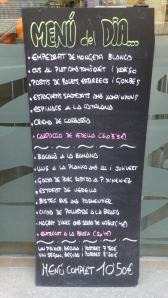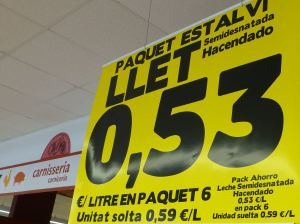Nothing could have prepared me for Catalan. Well, maybe my sixty years of French study and forty years of Spanish study and those two miserable years of Latin. But the Catalan independence movement around here has become so fierce that the signs and menus are no longer bilingual in Catalan and Castilian Spanish, as they were just last year. It’s all Catalan, all the time.
Derived from ancient rustic Latin spoken by Roman soldiers, Catalan is often easy to read. Privat means private, a pol is a pole, and a bol is a bowl. But it’s confusing. It often cuts off the last consonant of Spanish: estacion (station) is estacio, aproximacion is aproximacio. Other times, it adds a consonant that you have to pronounce: Argeles, a beach town in French Catalonia, should be pronounced by both French and Spanish with a silent “s.” But everybody pronounces the final “s.” Because it’s Catalan.
All of this is merely interesting and amusing until you are faced with an all-Catalan menu, as we were for Sunday tapas. Though hungry, I pulled out my new Catalan dictionary (the Spanish one is just getting dusty) and looked up the mystery words:
- embotit: “A kind of sausage.”
- botifarra: “A kind of sausage.”
- llonganissa: “A kind of sausage.”
- salsitxa: “A kind of sausage.”
And then there were six words meaning chorizo. which is … a kind of sausage.
Finally we ordered Patates Braves (fierce potatoes), and Queso Manxega, which we interpreted as cheese puffs because manxa means “bellows.” We’re trying, okay?
 We knew the Fierce Potatoes were fries with Russian dressing, but it turns out the Manxega was Manchego cheese, served with bread smeared with tomato, a beloved Catalan snack. We tried too hard on that one.
We knew the Fierce Potatoes were fries with Russian dressing, but it turns out the Manxega was Manchego cheese, served with bread smeared with tomato, a beloved Catalan snack. We tried too hard on that one.
We are both baffled. Tom came here to learn Spanish by immersion, but nobody’s speaking Spanish. I came here with a total of 102 years of Romance language education stuffed into my brain. Neither one of us knows what’s going on.
Still, in only a week, we’ve absorbed a lot of Catalan. Maybe when Catalonia takes over the world, there will be a need for skilled Yankee interpreters. That’s what we’re working towards.
Or maybe just being able to order lunch.


There’s a book here. Or am I over-stating the obvious?
Anyway, file more often. I’m loving it.
LikeLike
Thank you Claire! Outline the book for me, okay?
LikeLike
Um, I will have to fly there to see for myself. Then I’ll have my people call your people.
LikeLike
Let me know if you find any Catalan Sheep dog litters. I am looking for a Catalan Sheepdog. Since you are in the area, it’s just perfect! Many thanks, Catherine
LikeLike
OK. We’re looking. But first I had to know what we’re looking FOR, so I visited catalansheepdogs.co.uk. Now I can see why you want one. Fine looking dogs! There are a number of city dogs in Girona, as you might expect, but never, EVER any dog messes on the sidewalk. Score another point for the Catalonians.
LikeLike
Loving your entries! I see why you beat me out in the essay contest in high school!
Mary.
LikeLike
You sweetie. Thanks.
LikeLike
Terri and I have a smattering of Spanish, French, and what we term “infant level” Arabic at our disposal. When we visited Turkey, none of these were useful in any way. And our experience there was that no matter what we ordered from the menu, we ended up with shish kebabs (which, after the first 5 times, we lovingly called “camel balls). It might have been a cruel joke on the foreigners, but it got to be pretty funny after a while. And amazingly, we still love us some camel balls. ~James
LikeLike
Good one! Today they would be horse balls….
LikeLike
fascinating. wow.
LikeLike